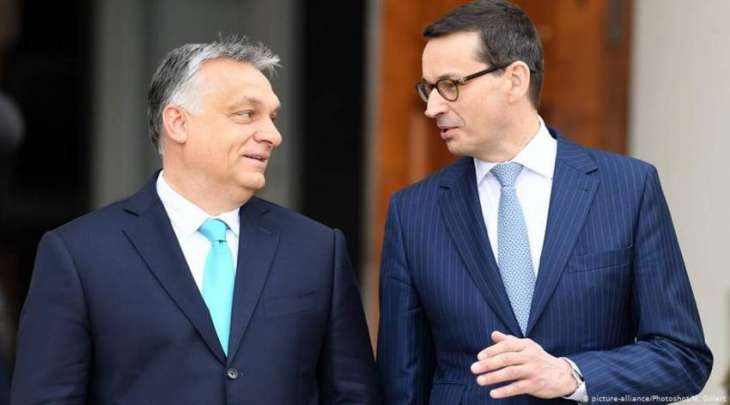The European Union's ambitious 1.8 trillion euro ($2.1 trillion) seven-year budget and COVID-19 recovery plan has once again run into difficulties as Hungary and Poland continue to voice their disapproval of the bloc's attempt to link funding to the observation of centrally agreed democratic norms
BRUSSELS (Pakistan Point News / Sputnik - 19th November, 2020) The European Union's ambitious 1.8 trillion euro ($2.1 trillion) seven-year budget and COVID-19 recovery plan has once again run into difficulties as Hungary and Poland continue to voice their disapproval of the bloc's attempt to link funding to the observation of centrally agreed democratic norms.
The current year has been a tumultuous one for the European Union and the COVID-19 pandemic has not been the sole reason for this. Coming into 2020, European leaders clashed over the size of the bloc's new seven-year budget, also known as the multiannual financial framework, which is set to run from 2021 to 2027.
The heads of state of all 27 EU countries held four days of heated negotiations in July with the aim of finally concluding a deal that would fund the bloc's activities and aid the economic recovery from the crisis caused by the coronavirus disease pandemic.
A deal was eventually reached, as European leaders signed up to a 1.074 trillion seven-year budget and a COVID-19 recovery fund, named Next Generation EU, worth 750 billion Euros.
The agreement was not universally celebrated, particularly as leaders in Brussels attempted to implement the so-called rule of law mechanism, which looks to make access to EU funds contingent on the observance of democratic values.
Hungary and Poland are believed to be the two Primary targets of the rule of law mechanism, particularly after the European Commission launched proceedings against Warsaw in 2017 and Budapest in 2018 after concerns were raised over the independence of judges in both countries.
The Council of the European Union and the European Parliament came to an agreement on proposed changes to the budget on November 10, paving the way for its ratification in the parliament. However, the dynamic shifted this past Monday at a Committee of Permanent Representatives II (Coreper II) meeting.
The ambassadors of all 27 EU member states gathered on Monday to vote on the new budget and recovery fund. At the meeting, the representatives of both Hungary and Poland voiced their disapproval and vetoed the plans, following through on previous threats.
Speaking on Wednesday, Hungarian Prime Minister Viktor Orban said that his country rejected the budget plans because Brussels was attempting to make supporting immigration a crucial part of the rule of law mechanism.
"In Brussels today, they only view countries which let migrants in as those governed by the rule of law. Those who protect their borders cannot qualify as countries where rule of law prevails," Orban said in a statement.
Orban's Polish counterpart, Mateusz Morawiecki, had previously called the rule of law initiative a "discretionary" mechanism that was based on "arbitrary, politically motivated criteria," and warned prior to Monday's Coreper II meeting that the Polish representative would veto the proposals.
With less than six weeks remaining until the budget is expected to come into force, time is running out for the European Union.
HUNGARY, POLAND RECEIVING SUPPORT
A major chink in the European Union's armor appeared on Wednesday, as Slovene Prime Minister Janez Jansa came out in support of Hungary and Poland in the rule of law row.
In a letter addressed to European Council President Charles Michel and European Commission President Ursula von der Leyen, Jansa criticized the attempts to force through the rule of law mechanism via a majority vote.
The Slovene prime minister added that his country would respect the rule of law mechanism when it is applied "unconditionally and without double standards."
The position of Warsaw and Budapest has also received the support of many right-wing lawmakers across Europe. Gilles Lebreton, a French member of European Parliament representing the National Rally party, told Sputnik that Hungary and Poland were well within their rights to veto the proposal.
"There is, thank God, still the rule of unanimity at the European Council. Poland and Hungary have the right to veto the diktat from Brussels. They did and maintain their position. So if the European budget is stuck, it is because of Ursula von der Leyen and Charles Michel accepting this charade," Lebreton said.
According to the French lawmaker, EU leaders will have to make concessions if they want to have any hope of getting the budget plans approved before the start of 2021.
"Brussels will have to admit defeat on this. Poland and Hungary will not give in without having obtained satisfaction on conditionality. Otherwise they will be lost and they know it. The Commission will impose on them a way of life and 'values' that they do not want," Lebreton remarked.
Poland and Hungary were expected to be two major beneficiaries of EU funds in the next multiannual financial framework, and Dr. Joerg Meuthen, a member of European Parliament representing Germany's Alternative for Germany (AfD) party, said that the veto showed it was not always possible to buy compliance.
"It is remarkable that Poland and Hungary would be net winners of this 1.8 trillion euro package, but would still block it ... Not everything and everyone can be bought," Meuthen told Sputnik.
The German lawmaker also accused Brussels of being hypocritical in its own observation of issues that would fall under the rule of law mechanism.
"They [Poland and Hungary] would not like to see disbursements of EU funds tied to compliance with the 'rule of law,' since they know quite well that the EU defines standards of the rule of law very selectively and in line with its left-wing globalist agenda, whereas the EU itself is not complying with these standards," Meuthen stated.
Others have been more critical of Hungary and Poland's decision to veto the EU's budget and COVID-19 recovery proposal.
Italy is expected to be the largest net contributor from the NextGenerationEU fund, and Tiziana Beghin, the 5 Star Movement's head of delegation at the European Parliament, slammed the "irresponsible" decision to potentially delay the distribution of funds.
The European People's Party group, a center-right faction in the European Parliament, has also come out against the veto.
Faction leader Manfred Weber, a German politician, issued a statement on Wednesday saying that Hungary and Poland would have to explain their actions to "millions of workers and business owners."
The bloc's leaders, such as von der Leyen and Michel, have yet to definitively comment on Poland and Hungary's decision to oppose the budget proposals.
The European Council is set to convene on Thursday, and although the meeting is expected to focus on the bloc's response to the coronavirus disease pandemic, talk will likely turn to the budget crisis.
It remains to be seen how quickly Brussels can manage to get all parties on side as it looks to push through its ambitious financial plans.




